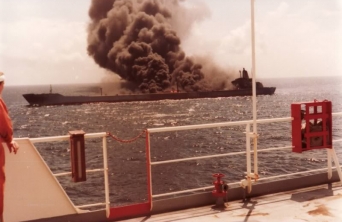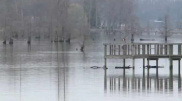Atlantic Empress And Aegean Captain Oil Spill: A Brief History
Just over a month after Mexico's Ixtoc Oil Spill, the collision of two supertankers in the Caribbean created one of the largest oil spills ever recorded. But if the name doesn't ring a bell, you're not alone.
Because the public's focus was elsewhere, much of what occurred washed away with the waves.
On July 19, 1979, two tankers -- the Atlantic Empress and the Aegean Captain -- collided off of the coast of Tobago Island near Venezuela. Each vessel was carrying over 200,000 tons of crude oil.
A thunderstorm had thrown the Empress off course, unwittingly creating a path directly in line with the Captain.
Piskopianos Christos, the Captain's second officer in command, told UPI that his crew followed a "law of the sea" when they saw the Empress and immediately started turning left. The last-minute maneuver allegedly minimized the damage of their ship.
"If we had rammed the other ship straight into the side, there would have been a big explosion and a 100 percent loss," said Christos.
Soon after the collision, a series of explosions erupted and fire broke out on both the Captain and the Empress. Although the fire on the Captain was soon contained, the Empress continued to burn for almost two weeks. Finally, the ship collapsed into the ocean on August 3, leaving an oily slick in its wake.
Meanwhile, the Captain was towed away with minimal leakage. Most of the spill leaked from the Empress, as its powerful fire prevented prompt cleanup methods.
Crews on both vessels abandoned ship but the disaster eventually claimed the lives of 26 from the Empress and one from the Captain.
Most of the oil was said to have dissipated into the sea, and news reports of the surrounding areas only reported minimal shoreline oiling.
However, professional and scientific studies of the area were not conducted, leaving the ultimate effects on the environment unknown.
"If it's not in a popular place and there's not a huge outcry of the people that live in the area, probably not much is going to happen," said Wes Tunnell, the Associate Director of the Harte Research Institute for Gulf of Mexico Studies in Corpus Christie, Texas, to CNN.






